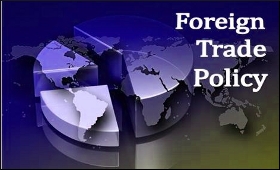|

|
FTP not necessarily an instrument to increase exports: New Commerce Secy
|
|

|
|
| Top Stories |
 |
|
|
|
Saurabh Gupta | 20 Feb, 2014
Ahead the upcoming Foreign Trade Policy (FTP) for the period 2014-19, the newly appointed Secretary in Department of Commerce, Rajeev Kher Thursday made it clear that FTP is not just an instrument to increase trade.
"FTP is not necessarily just an instrument that we talk about for increasing exports. We have to recognize that this is the environment with in which the Foreign trade policy, the instruments, are embedded and therefore until we do something about the environment, until we start playing very significant role in manipulating the environment these instruments will only have the limited acuity," said Rajeev Kher, Commerce Secretary.
"The ultimate issue is, Are we inherently competitive?," he added.
He was addressing the fourth edition of Export Summit with the theme "Foreign Trade Policy: Deepening India's Presence in Global Markets" organised by The Confederation of Indian Industry (CII) in New Delhi.
"We are in the process of finalising FTP-2014-19. It will take few months to dish out the final product," he told media on the side lines of the event. The new policy is likely to be unveiled in April, reports media. The five year FTP (2009-14) would end on March 31, 2014. The current policy provided fiscal incentives including that of interest subsidy and other duty neutralisation schemes.
Highlighting that export subsidy is not a long term solution, Kher informed the audience that the benefits that India enjoys at present under Annex VII of the WTO Agreement on Subsidies and Countervailing Measures (ASCM) may soon come to an end. The WTO prohibits the use of export subsidies on manufactured products as a general rule, but the countries which are listed in Annex VII of the ASCM, are exempted from the prohibition. This exemption is available until GNP per capita of a country reaches USD 1,000 in constant 1990 dollars for three consecutive years.
He informed that the textile sector is now not eligible for export subsidies as it has become competitive. Article 27.6 of WTO ASCM agreement suggests to phase out subsidies for product, which has reached export competitiveness.
He said, "The textile sector is reported to have crossed 3.5 percent share in the global market on a certain point of time then therefore the textile sector has gone into the area of globally competitive as defined by WTO Law. And therefore Indian textile sector is not now eligible for export subsidy. Sooner or later we see more sectors reaching to that phase."
"As per WTO law, if any product area of any country goes beyond 3.25 percent of its global share then it is considered as competitive." A product is called competitive when its share reaches at least 3.25 per cent in world trade for two consecutive calendar years.
When asked which the other sectors are, he said, "the sectors where we may have larger than 3.25 percent contribution."
The commerce secretary also said that the global trade discourse today has shifted towards value chains. He said that industry need to engage with the government to identify specific sectors where such value chains will be beneficial for the country for deepening the presence in global markets. He highlighted the importance of India's strength in service sector in this regard.
He said that Free Trade Agreements (FTA) are not evil. Kher requested all the Indian businesses to explore the opportunities in various FTAs that India signed in last few years. He also elaborated India's ongoing Regional Comprehensive Economic Partnership (RCEP) negotiation. The RCEP is being negotiated by all 10 members of the Association of Southeast Asian Nations, along with China, Japan, South Korea, Australia, New Zealand and India. Kher said that the RCEP is a great opportunity for India as it is going offer a huge territory for seamless movement of goods and services.
Kher spoke of the growing importance of Latin American countries, Africa, South Asia, Commonwealth of Independent States (CIS) countries and Cambodia-Laos-Myanmar-Vietnam (CLMV) as new markets for Indian products. He informed that the Ministry of Commerce is considering Free Trade Agreements with Russia, COMESA, Peru and Columbia.
Export Summit is CII's annual flagship event which brings together key policy makers, industry leaders, institutions and academia and aims to outline a definite road-map that would make Indian Exports more competitive globally.
This Summit provides a platform to discuss on India's Foreign Trade Policy to be adopted, especially in these challenging times.
|
|
|
| |
|
|
|
|
|
|
|
|
|
|
|
|
|
|
| |
| Customs Exchange Rates |
| Currency |
Import |
Export |
US Dollar
|
66.20
|
64.50 |
UK Pound
|
87.50
|
84.65 |
Euro
|
78.25
|
75.65 |
| Japanese
Yen |
58.85 |
56.85 |
| As on 13 Aug, 2022 |
|
|
| Daily Poll |
 |
 |
| PM Modi's recent US visit to redefine India-US bilateral relations |
|
|
|
|
|
| Commented Stories |
 |
|
|
|
|
|
| |
|